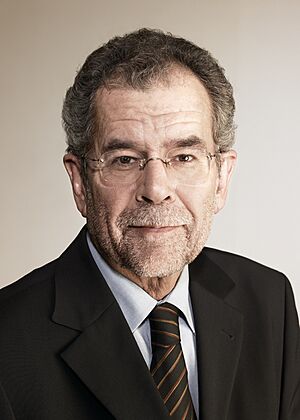Alexander Van der Bellen facts for kids
Quick facts for kids
Alexander Van der Bellen
|
|
|---|---|
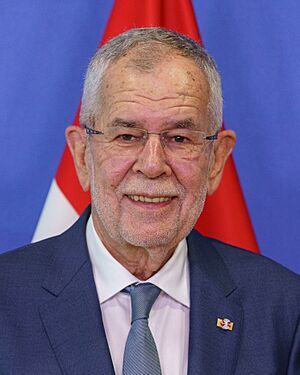
Van der Bellen in 2021
|
|
| President of Austria | |
| Assumed office 26 January 2017 |
|
| Chancellor | |
| Preceded by | Heinz Fischer |
| Spokesman of the Green Party | |
| In office 13 December 1997 – 3 October 2008 |
|
| Preceded by | Christoph Chorherr |
| Succeeded by | Eva Glawischnig |
| Member of the National Council | |
| In office 7 November 1994 – 5 July 2012 |
|
| Nominated by | Peter Pilz |
| Affiliation | Green Party |
| Personal details | |
| Born | 18 January 1944 Greater Vienna, Alpine and Danube Reichsgaue, Greater German Reich (now Vienna, Austria) |
| Citizenship | |
| Political party | Independent (2016–present) |
| Other political affiliations |
|
| Spouses |
Brigitte Hüttner
(m. 1962; div. 2015)Doris Schmidauer
(m. 2015) |
| Children | 2 sons (with Brigitte) |
| Parents |
|
| Relatives | Van der Bellen family |
| Residences | |
| Alma mater | University of Innsbruck (Dr. rer. oec.) |
| Profession | |
| Awards | List of honours and awards |
| Signature | |
| Website |
|
Alexander "Sascha" Van der Bellen (born 18 January 1944) is an Austrian politician. He has been the President of Austria since 2017. Before becoming president, he was a professor of economics at the University of Vienna. He also served as the leader, or "spokesman," of the Austrian Green Party.
Van der Bellen was born in Austria. His parents were refugees from Estonia, which was occupied at the time. He and his parents became Austrian citizens in 1958. His family has Dutch roots from the 18th century and later lived in the Russian Empire.
He was a member of the National Council, which is like Austria's parliament, from 1994 to 2012. During this time, he led the Green Party and its group in parliament.
In the 2016 Austrian presidential election, he ran as an independent candidate, though he was supported by the Green Party. He won the election against Norbert Hofer. However, the results of the second round had to be redone because of issues with counting absentee votes. He won again in the re-election on 4 December 2016, getting about 54% of the votes.
Van der Bellen describes himself as a centrist liberal. He supports green and social liberal ideas. He is also a strong supporter of the European Union and believes in countries working closely together in Europe. He is the first directly elected Green president of a European Union country.
Life Story
Early Life and Family Background
Alexander Van der Bellen's family came from the Netherlands in the 1700s and moved to the Russian Empire. During the Russian Civil War (1917–1922), some of his family fled to the newly independent Estonia. His grandfather, Aleksander von der Bellen, was a government leader in Pskov, Russia. In Estonia, the family changed their name to Van der Bellen.
In 1940, Estonia was taken over by the Soviet Union. In 1941, Van der Bellen's parents, Alexander and Alma, and his older sister moved to Nazi Germany. His parents later settled in Vienna, where Alexander was born in 1944. As the war ended, his family moved to the Kauner valley in Tyrol.
He finished primary school in Innsbruck and then went to the Academic Grammar School Innsbruck, graduating in 1962. He became an Austrian citizen around 1958, having been an Estonian citizen before that.
Education and Career
Van der Bellen studied economics at the University of Innsbruck. He earned his master's degree in 1966 and his doctorate in 1970. He worked as a scientific assistant at the University of Innsbruck and later as a research fellow in Berlin.
In 1976, he became an associate professor at the University of Innsbruck. From 1980 to 1999, he was a professor of economics at the University of Vienna. He also served as the dean of the economics faculty there from 1990 to 1994. In 1999, he became a parliamentary leader for the Green Party, so he stopped being a university professor in 2009.
His studies focused on how governments plan and pay for public services, like infrastructure and environmental policies.
Family Life
Van der Bellen married Brigitte Hüttner when he was 18 and had two sons with her. They were married for over 50 years before divorcing in 2015. In December 2015, he married Doris Schmidauer, a longtime friend. He lives in Vienna and also has a home in Kaunertal, Tyrol.
Religion
As a young man, Van der Bellen left the Lutheran Church. However, in 2019, he rejoined the Protestant Church.
Estonian Connection
After Van der Bellen won the 2016 Austrian presidential elections, the President of Estonia, Toomas Hendrik Ilves, congratulated him. The Estonian government has said that Van der Bellen could get his Estonian passport back at any time. This is because his parents were Estonian citizens in 1940, and children of such parents can automatically become citizens.
Nickname
Friends and colleagues sometimes call Alexander Van der Bellen "Sascha," which is a shorter version of his first name.
Political Journey
Joining Politics
Van der Bellen was a member of the Social Democratic Party in the 1970s and 1980s. Later, he became interested in the environmental movement. His former student, Peter Pilz, who was a leader of the Green Party, encouraged him to join. Van der Bellen described his political journey as moving from being an "anti-capitalist" to a "liberal."
In 1997, Van der Bellen became the leader of the Green Party. He was the longest-serving leader in the party's history, holding the position for almost eleven years until 2008. Under his leadership, the Green Party gained more votes in three elections. After the 2008 election, he stepped down as party leader.
Member of Parliament
Van der Bellen served as a member of the National Council, Austria's parliament, from 1994 to 2012. From 1999 to 2008, he was the parliamentary leader for the Green Party. He worked on various committees, including those for budget, finance, and foreign affairs.
In 2011, he was chosen as the Commissioner for Universities and Research for the city of Vienna. In this role, he worked to improve the relationship between the city and its universities.
Political Beliefs
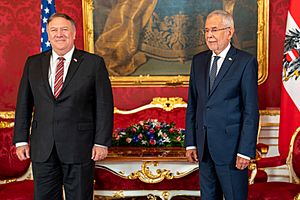
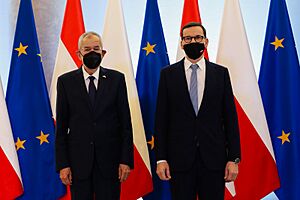
Van der Bellen sees himself as a liberal politician who stands in the political centre. He strongly supports the European Union and believes in closer cooperation among European countries. His campaign slogan for the presidential election was "Our President of the Centre."
During the European migrant crisis, Van der Bellen argued that Europe should welcome refugees fleeing from war. He often mentioned his own background as the son of refugees. He has also spoken out against Islamophobia.
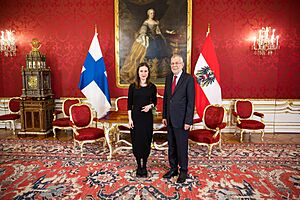
He has criticized leaders like U.S. President Donald Trump and Turkish President Recep Tayyip Erdoğan, warning about the dangers of right-wing populism. He believes that the British withdrawal from the European Union (Brexit) is harmful to both the UK and Europe. He also opposes Russia's takeover of Crimea.
In 2024, during the Austrian legislative election, Van der Bellen promised to ensure that any new government would respect Austria's democratic values.
Presidential Elections
Campaign and First Election
Van der Bellen announced his plan to run for president in the 2016 Austrian presidential election on 8 January 2016. He ran as an independent candidate, even though he had been the Green Party leader for many years. He temporarily stopped his party membership to show he would be fair to all parties if elected.
The Green Party still supported his campaign, setting up an organization to help him. This organization raised money from private donations.
In the first round of the 2016 election, Van der Bellen came in second place. In the second round, or runoff election, on 22 May 2016, he was initially behind. However, once all the votes, including postal votes, were counted, he won with 50.35% of the valid votes, a lead of just over 31,000 votes.
Election Annulment and Re-election
After the election, the Freedom Party of Austria challenged the results, saying there were problems with how postal votes were counted. On 1 July 2016, the Constitutional Court agreed, and the election had to be repeated across Austria.
Van der Bellen won the repeated runoff election on 4 December 2016, with 53.8% of the votes. This time, his lead was much larger, over 348,000 votes.
On 22 May 2022, Van der Bellen announced he would run for a second term. He won re-election in the 2022 Austrian presidential election on 9 October 2022, securing 56.2% of the votes.
Inauguration
Alexander Van der Bellen officially became the President of Austria on 26 January 2017. After his inauguration speech, he met with the government and was welcomed with a military ceremony as the new commander-in-chief of the Austrian armed forces.
Honours and Awards
Austrian honours
Foreign honours
Other awards
- Statue der Erinnerung of the International Auschwitz Committee (2018)
See also
 In Spanish: Alexander Van der Bellen para niños
In Spanish: Alexander Van der Bellen para niños
 | Percy Lavon Julian |
 | Katherine Johnson |
 | George Washington Carver |
 | Annie Easley |


